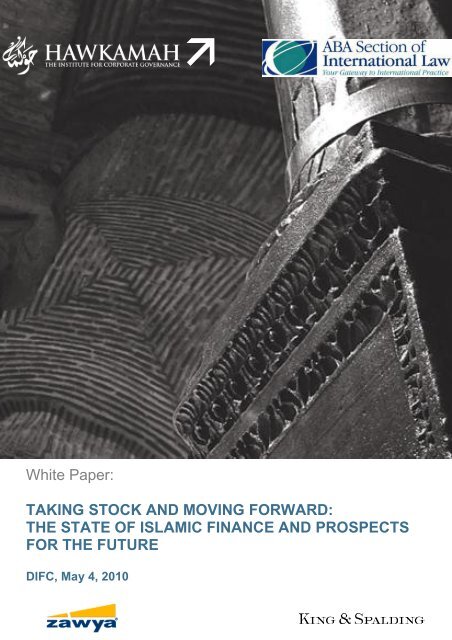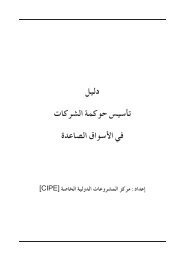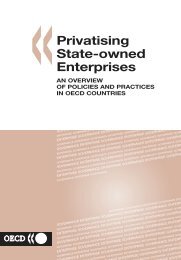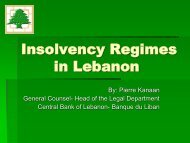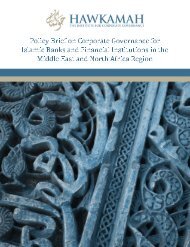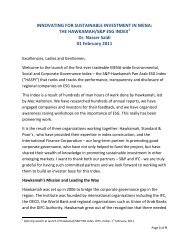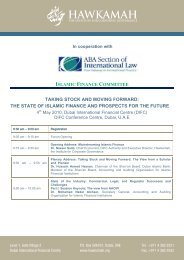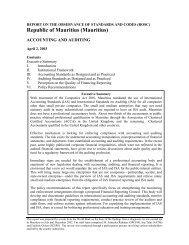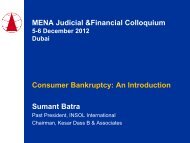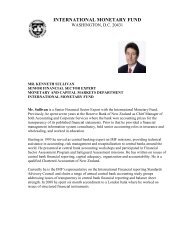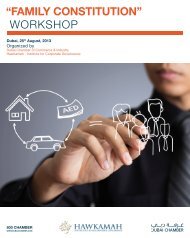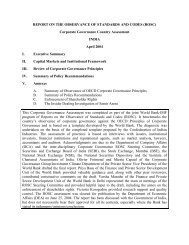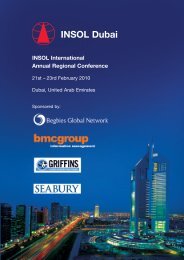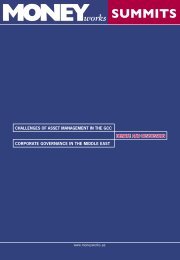THE STATE OF ISLAMIC FINANCE AND PROSPECTS FOR THE ...
THE STATE OF ISLAMIC FINANCE AND PROSPECTS FOR THE ...
THE STATE OF ISLAMIC FINANCE AND PROSPECTS FOR THE ...
- No tags were found...
You also want an ePaper? Increase the reach of your titles
YUMPU automatically turns print PDFs into web optimized ePapers that Google loves.
ContentsPyrrhic Victory for Islamic Finance: The further growth of the Islamic Finance industry ............. 5By Jawad I. Ali and Omar SalahThe Front Office Generates Revenue, the Back Office Creates Value: Operational Excellence isthe Key to Unlocking Lasting Value in Islamic Finance ................................................................. 17By Hdeel AbdelhadyWhat are the Real and Perceived Shari’ah Governance Issues? .................................................. 25By Hari BhambraUAE laws And Islamic Shari’ah: Some practical issues ................................................................ 28By Alan RodgersLocal Law Obstacles to Structuring an Islamic Financing in the U.A.E and Saudi Arabia .......... 31By Nabil IssaTaking Stock and Moving Forwad P a g e | 3
DisclaimerThis White Paper is intended to further the discussion of the key issues addressed at the American BarAssociation Section of International Law (the ―ABA SIL‖) and Hawkamah program, Taking Stock and MovingForward: The State of Islamic Finance and Prospects for the Future, held at the DIFC on May 4, 2010. Thethoughts expressed herein are those of the authors only, and do not reflect the views of the ABA SIL orHawkamah, or any of their members or affiliates.We welcome feedback on and responses to this White Paper by email to Hawkamah at info@hawkamah.org andthe ABA-SIL at habdelhady@law.gwu.eduTaking Stock and Moving Forwad P a g e | 4
Pyrrhic Victory for Islamic Finance: The Further Growth of the Islamic FinanceIndustryBy Jawad I. Ali 1 and Omar Salah 2IntroductionThis White Paper discusses the current state of the Islamic finance industry. The authors argue that in an attemptto facilitate growth in the industry, the industry seems to have forgotten its identity. Reaching a juncture today,the authors advocate that the industry has to take a different direction and move towards more genuine Islamicfinancial products and transactions that are in line with the essence and spirit of Islamic finance, Islamiceconomics, and Islamic Shari’ah.First, the current state of the Islamic finance industry is described. The authors emphasize that the industry hasreached an important point from where we have to decide how to move forward. Certain commonly usedinstruments are highlighted to illustrate the current industry. The authors stress the importance of the essenceand spirit of Islamic finance and give a description of it by placing it in the bigger picture of Islamic economicswhich finds its roots in Islamic Shari’ah. The importance of equity-based financing is emphasized.This is followed by a description of current practice, which is dominated by debt-based financing and structuresthat are not always enforceable from a legal perspective. Based on the analysis of the backgrounds of Islamicfinance and its current practice, the authors point out two aspects that need further attention.First, the widespread use of debt-based instruments to finance projects and investments that may be moresuitably financed through equity-based instruments is highlighted. Recommendations are made on how to dealwith such financing and how to balance the use of equity-based and debt-based instruments. Second, the (im)balance between the Shari’ah-compliance of Islamic financial products and transactions and their legalenforceability is discussed. The authors recommend that the Shari’ah-compliance of financial products andtransactions cannot be regarded separately from their legal enforceability. There must be a balance between thetwo and the authors cannot find such a balance in the financial products and transactions dominating the currentmarket.1 Jawad I. Ali, Managing Partner of Middle East Offices, King & Spalding; Global Deputy Head of Middle East & IslamicFinance Practice Group, King & Spalding.2 Omar Salah, Intern-Associate at Middle East & Islamic Finance Practice Group, London Office, King & Spalding; PhDResearcher Islamic Finance & Lecturer Corporate Finance at TISCO Research Institute of Private Law Department, TilburgLaw School, the Netherlands.Taking Stock and Moving Forwad P a g e | 5
1. Current State of Islamic Finance IndustryThe current state of the Islamic finance industry can be compared to the life span of a 40 year old man sufferingfrom childhood phobias. The childhood fears of the man are a result of an experience as a ten year old child whotried to climb up a mountain, but got so exhausted that he decided to give up. However, he was determined toclimb the same mountain once he would grow up. Therefore, he dedicated the rest of his life training. After 30years of training the man was finally able to climb the mountain. However, restricted by childhood fears of theimpossibility to climb the mountain, he seemed to continue his training extending his ultimate objective. By doingso he seemed to forget two important points: first, he is not the ten year old child anymore and, second, being a40 year old man, he should not wait much longer.This short anecdote illustrates the current state of the Islamic finance industry and its growth over the last 30years. In order to realize the growth of the last 30 years, the industry has made several exceptions andcompromises under the argument of ‗the industry needs to be established first, before we can move towards atrue Islamic financial system‘. However, now that the industry has established itself as a market to be reckonedwith3, this argument is not valid anymore. By posing such an argument, we seem to forget that our currentindustry is not the same as it was 30 years ago.The last 30 years have proven that the problem of standardization is an issue that needs to be dealt with in thelong term. Nevertheless, this does not mean that our current Islamic financial products should not be as genuineas possible and neither should it prevent us from making efforts to move towards a true Islamic financial system.Since the credit crunch, the industry has been experiencing an influx of conventional investors consideringShari’ah-compliant financing as an alternative. At this moment, we should make sure that Islamic finance offers areal alternative and that it is not merely another name for structures with the same economics as conventionalstructures. This is, moreover, important in order to give the industry its own identity as we have been trying to dofor the last 30 years. We should not wait much longer, because otherwise we will have a completely establishedsystem that will be called Islamic finance, but will have the economics of conventional finance.Therefore, we believe that it is important to understand the basics of Islamic economics and finance. 4 We have toidentify what makes Islamic economics different from Capitalism and Marxism in order to decide upon the3 This is evidenced by the growth of the industry, its expansion towards non-Islamic countries, and its future prospects.Islamic banking assets rose by 28.6 % in 2009 to $822 billion from $639 billion in 2008, see The Banker & HSBC Amanah,Top 500 Islamic Financial Institutions, available athttp://top500islamic.thebanker.com/index.cfm?fuseaction=top500.home&CFID=1053940&CFTOKEN=10177553.Furthermore, Islamic finance is gaining ground in the Western world as well, as is evident from certain developments inEurope and the United States, see for example D. Oakley, The Future of Islamic Finance, London leads in race to be westernhub, FINANCIAL TIMES, Dec. 8, 2009; Islamic finance in France, Shari’ah calling, <strong>THE</strong> ECONOMIST, Nov. 14, 2009. Inaddition, Moody’s expects the long-term potential of the market to reach USD 5 trillion and the Global Head of IslamicFinance of Thomson Reuters expects the industry to reach USD 2 trillion within 5 years already, see S. Carhalvo & D.Holmes, Islamic finance set to cross $1 trillion-Moody's, REUTERS, June 14, 2010; Islamic finance set to be $2 trillionindustry globally within five years, AMEINFO, May 25, 2010.4 For the purpose of this White Paper we assume a general knowledge of Islamic finance, its main principles and basicstructures present with the reader. If the reader lacks such knowledge, we would like to recommend to gain that aknowledge by studying the established literature on Islamic finance, for example M.T. Usmani, An Introduction to IslamicFinance (Arab & Islamic Laws Series), The Hague: Kluwer 2001, M.A. El-Gamal, Islamic Finance: Law, Economics, andPractice, New York: Cambridge University Press 2006; M. Ayub, Understanding Islamic Finance, Chichester: John Wiley &(Footnote continued on next page)Taking Stock and Moving Forwad P a g e | 6
direction of our industry. The industry has reached a juncture at the moment and we would like to call upon theindustry to re-consider the direction it is taking. We believe two aspects of the current market deserve ourattention in particular. The first is the overreliance on debt-based instruments, which makes us move away fromthe essence of Islamic finance which we can find in equity-based financing. The second aspect is the imbalancebetween Islamic Shari’ah and the legal enforceability of certain Islamic financial products. These two pointsdeserve our attention, because both points touch upon the identity of Islamic finance and the Shari’ahcomplianceof the products. 52. Background of Islamic Finance & Islamic EconomicsIn order to make changes, we need to move to the core principles of Islamic finance. This section discusses thehistorical background of Islamic finance and its main principles that can be found in Islamic economics. Theposition of Islamic economics within Islamic Shari’ah is discussed. This is followed by a description of Islamiceconomics as such and Islamic finance as a part of Islamic economics. The background knowledge acquired willprovide comprehension of Islamic financial instruments.2.1 Background of Islamic EconomicsAs a result of the Islamic revival of the late nineteenth century, Islamic economics emerged as a distinct branchof economics. 6 Sayyid Jamal al-Din al-Afghani was one of the most influential pioneers of Islamic modernism andanti-imperialism from the 1880s. 7 His pioneering efforts were viewed with much respect by the Islamiceconomists, since they saw themselves as modernisers in his mould. 8 In the early decades of the twentiethcentury, there were dispersed writings on economic topics throughout the Muslim world. 9 The first real influentialwriter was Sayyid Abu al-A‘la Mawdudi, who established the term ‗Islamic economics‘. 10 Mohammed Baqir al-Sadr was another writer who added a significant contribution to Islamic economics with his book Iqtisaduna. 11Sons Ltd. 2007; F.R. Vogel & S.L. Hayes, Islamic Law and Finance: Religion, Risk and Return, The Hague: Kluwer LawInternational 1998.5 We acknowledge that there are other aspects as well that our current industry is facing and that deserve the attention.However, in order to mark out the research for this White Paper, we had to make choices and focus on aspects which we inparticular wanted to emphasize.6 R. Wilson, ‘The Development of Islamic Economics: Theory and Practice’, in: S. Taji-Farouki and B.M. Nafi (ed.), IslamicThought in the Twentieth Century, London: I.B. Tauris 2004, at 195 (hereinafter: Wilson 2004).7 N.R. Keddie, ‘Sayyid Jamal al-Din al-Afghani’, in: Ali Rahnema (ed.), Pioneers of the Islamic Revival, London: Zed Books1994, at 11-29.8 Wilson 2004, supra note 2, at 195.9 S.M.H. Rahman, Islam ka iqtisadi nizam, Delhi: Nadwat al-Musannifin 1942; S.M. Ahmad, Economics of Islam: AComparative Study, Lahore: Sh. Muhammad Ashraf 1947.10 Many of the followers of Sayyid Abu al-A’la Mawdudi had a good knowledge of Western neo-classical economics throughtheir undergraduate and postgraduate degrees and professional training, and were later to become significant contributorsto the literature themselves. Amongst its most notable contributors this new generation included: M.A. Mannan, IslamicEconomics: Theory and Practice, Lahore: Sh. Muhammad Ashraf 1970; M.U. Chapra, Islam and the Economic Challenge,(Footnote continued on next page)Taking Stock and Moving Forwad P a g e | 7
In his book, Baqir al-Sadr demonstrated the incompatibility of both Marxism and Capitalism with Islam, a viewsupported by other writers as well. 12 He emphasized that, contrary to Marxism, for Muslims the ends of economicactivities are spiritual. 13 Muhammad Nejatullah Siddiqi suggested that Marxism is in conflict with the basicrequirements of the moral and spiritual growth of the human personality, which in the economic sphere requiresprivate property and freedom of enterprise. 14 On the other hand, Mawdudi described Capitalism as extreme withexcessive accent on the rights of individual ownership and freedom of enterprise that inflicted suffering andprivation for those who owned less. 15 Siddiqi added to this that an unjustifiable focus on self-interest and the profitmotive in Capitalism gave rise to a society lacking human character, brotherhood, sympathy and cooperation. 16Syed Nawab Naqvi was critical of the neglect of human relations and especially the exploitation of labour inCapitalism. 17 Islam stresses a more generous attitude in regard to the ownership of wealth. 18 Therefore, most ofthe writers did not want to follow ‗positivist economics‘ and regarded Islamic economics as a different doctrine. 19The distinguishing feature of Islamic economics, as also pointed out by Mufti Muhammad Shafi, is that it is ameans to an end and not an end in itself. 20 The definition of Islamic economics begins with the assertion of thesources of Islamic Shari’ah: the Qur‘an, the Sunna, Ijma’, and Qiyas. Various writers differ about the extent towhich Ijtihad is allowed and which scholars can be regarded as the authoritative sources for understanding theLeicester: The Islamic Foundation 1992; S.N. Naqvi, Islam, Economics and Society, London: Kegan Paul International 1994;M.N. Siddiqi, Muslim Economic Thinking, Leicester: The Islamic Foundation 1981 (hereinafter: Siddiqi 1981).11 M.B. Al-Sadr, Iqtisaduna, Beirut: Dar al-Fikr 1961; K.J. Shubber, Our Economics: Iqtisaduna, London: Bookextra 2000; A.Rieck, Unsere Wirtschaft: Eine Gekürzle Kommentierte Übersetzung des Buches Iqtisaduna von Muhammad Baqir al-Sadr,Berlin: Klaus Schwarz 1984.12 R. Wilson, ‘The Contribution of Muhammad Baqir al-Sadr to Contemporary Islamic Economic Thought’, Journal of IslamicStudies 1998-9, at 46-59.13 Baqir al-Sadr stressed the different views of Islamic economics and Marxism. According to him, material consumptionand having power over resources are regarded as the ends for Marxists; these factors are only means for Muslims and theends are spiritual. He, furthermore, rejected the class categorisation of Marxism as simplistic, because capitalists andworkers are, besides being products of a system of production, also - maybe, even more - human beings with moralresponsibilities, see Wilson 2004, supra note 2, at 202.14 Siddiqi 1981, supra note 6, at 52-3.15 S.A.A. Mawdudi, Islam aur jadid m’ashi nazariyat, Lahore: Islamic Publishers 1966, at 52-83.16 Siddiqi 1981, supra note 6, at 46.17 Id., at 205.18 Wilson 2004, supra note 2, at 205.19 A.Al-H.M. Al-Ba’li, Maqasid al-Shari’ah wa-mushkilat al-hajjat fi al-iqtisad, Cyprus: International Institute for IslamicBanks and Economy 1987, at 31-3; M.M. Nur, Al-Iqtisad al-Islami, Cairo: Maktabat al-Tijarah wa Ta´awun 1978, at 18-20(hereinafter: Nur 1978); Y. Kamal, Adwa’ ‘ala-fikr al-iqtisadi al-Islami al-mu’asir, Cairo: Majallat al-Da´wah 1980, at 17-8;M.S. Al-Fanjari, Dhatiyat al-siyasiyat al-iqtisadiyat al-Islamiyah, Cairo 1981, at 18-20; M.S. Al-Fanjari, Al-Madhhab aliqtisadifi al-Islam, Cairo: al-Hai´at al-Misriyat al-´Ammah li-l-Kitab 1986, at 91-3; M.M. ‘Uthman, Nazriyat al-infitah aliqtisadifi al-Islam, Cairo: al-Dar al-Misriyah li-l-Tab´ah wa-l-Nashr 1990, at 33-4.20 Mufti M. Shafi, Distribution of Wealth in Islam, Karachi: Ashraf Publications 1978 (translated into English by M.H. Askari& K. Husain).Taking Stock and Moving Forwad P a g e | 8
ules of Islamic economics. 21 Consequently, there has been contrasting approaches among Muslim intellectualshelping to define this field. 22 Some of these intellectuals focused on what the sources of Islamic Shari’ah have tosay about riba, zakat, the status of property, accounting, and the market. 23 Others tried to develop an explicit setof Islamic values for economic activity endeavouring to ensure that their interpretations remain true to theprinciples contained in the sources of Islamic Shari’ah, while trying to engage successfully with the economicsphere as presently constituted at the same time. 24 Islamic finance has been part of the latter movement. It mustbe emphasized that this movement strived to ensure to remain true to the principles of Islamic Shari’ah.2.2 Background of Islamic FinanceFrom the 1950s, publications on interest-free banking started to appear and a notable early contributor was thescholar Muhammad Uzair. 25 The key concept of Islamic finance is that lenders must participate in the risk of thebusiness, in order to earn a reward. 26 The Islamic economic model emphasises fairness .27 Islamic banking hasthe same purpose as conventional banking, except that it operates in accordance with Fiqh al-Mu’amalat, whichcontains the Islamic rules on transaction. 28These rules are meant to achieve the higher purpose of Islamic economics, according to which the economicactivities are means to an end, the end being achieving (economic) fairness in society. Rules such as theprohibition on riba and gharar are meant to achieve fairness through equitable distribution of the wealth insociety. As Mufti Muhammad Taqi Usmani points out, the noble objective of the prohibition of riba is equitabledistribution among partners of revenues from commercial and industrial enterprises. 29 Therefore, Islamic financeprefers profit-and-loss-sharing (PLS) arrangements as a way of financing. 30 Mufti Usmani mentions that the real21 Nur 1978, supra note 15, at 53-5.22 C. Tripp, Islam and the Moral Economy: The Challenge of Capitalism, Cambridge: Cambridge University Press 2006, at111-112 (hereinafter: Tripp 2006).23 T. Philip, ‘The idea of Islamic economics’, Die Welt des Islams 1990-30, at 124-8; F. Nomani & A. Rahnema, IslamicEconomic System, London: Zed Books 1994, at 45-8. For ‘traditional’ approaches to the identification of Islamic economicssee M.H.A. Yahia, Iqtisaduna fi daw’ al-Qur’an wa-l-sunnah, Amman: Dar Amman lil-Nashr 1988; A.Al-S.D. Al-‘Abbadi, Al-Milkiyah fi al-Shari’aht al-Islamiyah, Amman: Maktabat al-Aqsa 1977; R.Y. Al-Masri, Usul al-iqtisad al-Islami, Damascus: Daral-Qalam 1989; M.K.Al-D. Imam, Usul al-hisbah fi al-Islam, Cairo: Dar al-Hidayah 1986; Y. Al-Qardawi, Dawr al-qiyam wa-lakhlaqfi al-iqtisad al-Islam, Cairo: Maktabah Wahbah 1995.24 Tripp 2006, supra note 18, at 111-112.25 M. Uzair, An Outline of Interestless Banking, Karachi: Raihan Publications 1955.26 A. Zaman, Islamic Economics: A Survey of the Literature (Working Paper 22 – 2008 of the Religious and DevelopmentResearch Programme), Birmingham: Department for International Development 2008, at 41 (hereinafter: Zaman 2008).27 M. Ainley et al., Islamic Finance in the UK: Regulation and Challenges, London: Financial Services Authority 2007, at 4.28 S.Q. Qadri, ‘Islamic Banking, An Introduction’, Business Law Today 2008-6, at 59.29 Mufti M.T. Usmani, Sukuk and their Contemporary Applications, AAOIFI Shari’ahh Council: 2008 (translated into Englishby: Y.T. DeLoranzo), at 13.30 M.O. Farooq, ‘Partnerships, Equity-Financing and Islamic Finance: Whither Profit-Loss Sharing?’, Review of IslamicEconomics, Vol. 11, Special Issue, 2007, at 67-88.Taking Stock and Moving Forwad P a g e | 9
and ideal instruments of financing in Islamic Shari’ah are the PLS arrangements, such as musharaka andmudarabah agreements. 31 These forms of equity-based financing are in line with the Islamic view on financialtransactions that one cannot be entitled to a reward if one has not taken any risk. However, Islamic finance alsoacknowledges debt-based instruments such as murabaha. These instruments were not originally modes offinancing, but were reshaped in order to meet certain needs. 323. The Role of Debt-Based Financing in the Current MarketBefore discussing the role of debt-based financing in the current market, it important to address its position withinIslamic finance as such. The dominating, and almost destructive, impact of murabaha contracts in particular willbe pointed out, after which recommendations are made to bring a balance in current practice.3.1 Debt-Based Financing within Islamic FinanceThe previous paragraph stressed the preference for equity-based financing as an ideal way of Shari’ah-compliantfinance. Debt-based finance is allowed under Islamic Shari’ah, but often as an exception to the rule. Forexample, the murabaha contract is in essence a contract of sale. A murabaha contract denotes a sale contract,whereby the seller adds a profit to the cost price of a commodity and discloses the cost price to the buyer. 33Initially it was not a mode of financing, neither meant to be used as a mode of financing; the ideal mode offinancing according to Islamic Shari’ah is musharaka and mudarabah agreements. 34 As Mufti Usmani mentions,murabaha as a mode of financing was merely allowed by Shari’ah scholars due to practical difficulties in thecurrent economic set up in using the equity-based financial contracts. 35 This clearly illustrates these debt-basedfinancial contracts such as the murabaha agreements were allowed as an exception to the rule.Furthermore, it is important to understand that besides being allowed as an exception, the murabaha agreementhas been subject to certain conditions, one of these conditions being that it may only be used as a mode offinancing where the client requires funds to actually purchase commodities. 36 This illustrates the possibility to usemurabaha for working capital, e.g. to finance the purchase of raw materials required for the company of theclient .37 As an exception to this condition, we have witnessed the contract of tawarruq, often referred to as thecommodity-murabaha, 38 in recent years as a tool to provide liquidity. 39 It must be noted that we are talking about31 Mufti M.T. Usmani, An Introduction to Islamic Finance, The Hague: Kluwer Law International 2002, at x (hereinafterUsmani 2002).32 Id.33 Id., at 37-41.34 Id., at 41.35 Id., at 41-4.36 Id.37 F.R. Vogel & S.L. Hayes, Islamic Law and Finance: Religion, Risk and Return, The Hague: Kluwer Law International 1998, at182 (hereinafter: Vogel & Hayes 1998).38 The industry is using the term tawarruq and commodity murabaha interchangeably. However, from a doctrinalperspective this is not entirely correct. In the strict sense, tawarruq is the purchase of an asset on deferred payments andthe sale of those assets to another party on the spot in order to get cash, as defined in a fatwa of the International Fiqh(Footnote continued on next page)Taking Stock and Moving Forwad P a g e | 10
esponsibility here: the use of metal murabaha and tawarruq agreements for purposes it is not meant for shouldbe approved as Shari’ah-compliant in only exceptional cases. Indeed, the whole industry - including investors,lawyers, investment bankers, and all others involved in the process - bear responsibility, but the truth of thematter is that so long these contracts are readily and easily available and approved as a Shari’ah-compliantalternative, the industry will not take the effort to move towards other contracts such as musharaka, mudarabah,istisna’, and ijara contracts.4 The Balance between Shari’ah-Compliance and Legal Enforceability4.1 Imbalance between Shari’ah-Compliance and Legal Enforceability: Transfer of OwnershipAs mentioned above, within Islamic economics, economic activities are a means to an end. By meeting certainShari’ah requirements, we should not forget that we should eventually stay true to the principles and objectives ofIslamic Shari’ah. A point where we see such a mismatch relates to the balance between the Shari’ah-complianceof the products and legal enforceability. The industry has witnessed several products over the last years thatexhibited an imbalance between Shari’ah-compliance and their legal enforceability. We submit that a Shari’ahcompliantinstrument and/or structure should always take into consideration the rules and regulations of theparticular jurisdiction and that the architects of such instruments and/or structures should make sure that suchinstruments and/or structures are enforceable under the law of such jurisdiction.This can be illustrated by the concept of ownership in Islamic financial transactions. 42 From a Shari’ahperspective ownership can be transferred by a contract that is valid under Islamic Shari’ah. 43 Within IslamicShari’ah, no explicit reference is made to registration formalities. Therefore, most Shari’ah scholars regard thetransfer of ownership of an immovable asset without fulfilling any registration formalities as valid under IslamicShari’ah. However, from a legal perspective in certain jurisdictions the Shari’ah owner does not become the legalowner if no registration formalities are fulfilled. As a consequence, the owner cannot enforce his rights as anowner in a court of law according to the law of the particular jurisdiction. Moreover, a significant part of thetransactions today are structured in jurisdictions outside the Muslim world where the Islamic Shari’ah is not partof its legal system. What is the meaning of being the Shari’ah owner of an asset, if one cannot enforce its rightsas the legal owner according to the law of a particular jurisdiction? We witnessed such imbalances between theShari’ah-compliance of a structure and its legal tenability at the end of 2009, when the Nakheel Sukuk went intodefault. 44 One of the aspects that were raised was the uncertainty on the position of the sukuk holders due to alack of formal registration systems in regard to leasehold rights and rights of mortgages during the issue of thesukuk in the United Arab Emirates. 4542 We would like to point out that the transfer of ownership is merely an example to make our point. The problem of animbalance between Shari’ah-compliance and legal enforceability, furthermore, relates to, inter alia, the enforceability ofwa’ad and the use of agency agreements in jurisdictions that do not recognize the concept of a trust.43 Vogel & Hayes 1998, supra note 33, at 102-5.44 For more on the legal aspects of the Nakheel Sukuk, see O. Salah, ‘Dubai Debt Crisis: A Legal Analysis of the NakheelSukuk’, Berkeley Journal of International Law, Publicist 2010, Volume 4, at 19-32.45 We acknowledge that the Nakheel Sukuk also had other legal issues that contributed to the uncertainty around thedefault, such as, inter alia, the (im)possibilities regarding the enforcement of foreign judgements in the United ArabEmirates and uncertainty on the role of the government.Taking Stock and Moving Forwad P a g e | 12
4.2 Importance of Shari’ah BackgroundWithin the Islamic Shari’ah, we can also find arguments to support this view. First of all, the importance of theniyya within Islamic Shari’ah should not be underestimated. As Zaman points out by referring to a hadith of SahihMuslim, an incorrect niyya can even invalidate the noble act of giving charity. 46 If our true intention - our niyya - isto transfer the ownership of an asset to another party, we should make sure that the new owner really becomesthe owner from both an Islamic Shari’ah and legal perspective and that he can enforce his right as an owner anenjoy the protection he needs as an owner. Second, the Quran dictates that it is preferable to write downcontractual obligations .47 Writing down contractual commitments gives the parties involved certainty on what isagreed upon in case of disputes. This has the same function as the registration formalities: fulfilling theseformalities by writing it down in public registers gives certainty in case disputes arise involving third parties. Thisillustrates that the essence of Islamic Shari’ah is often in line with the background of certain legal requirements.Therefore, we should consider the objectives of Islamic Shari’ah when structuring our transactions.We advocate that one cannot be the owner of an asset from a Shari’ah perspective if the person cannot legallyenforce its ownership interest. As a consequence, it is not enough that a structure is declared Shari’ah-compliant;it must also be legally enforceable. The Shari’ah-compliance and legal enforceability of a transaction should beinter-connected otherwise the meaning and importance of the Shari’ah ruling within a transaction will beundermined. Furthermore, it will lead to results whereby the specific requirements are met from a Shari’ahperspective, while the objectives of Islamic Shari’ah are not met.Summary of RecommendationsBased on the above we would like to make the following recommendations. First, we would like to emphasize theimportance of industry experts coming together to discuss these issues. Shari’ah scholars, academics,investment bankers, lawyers, accountants, and all others involved in the process must gather to address theseissues and search for a solution together. Therefore, initiatives such as that of Hawkamah and the American BarAssociation are not merely appreciated, but are also required in order for the industry to improve.In regard to the specific points discussed in this White Paper, we would like to make the followingrecommendations:The importance of equity-based financing must be acknowledged by the industry in practice, i.e. weshould move towards the use of musharaka and mudarabah contracts;The overreliance on debt-based financing should not continue;Murabaha agreements should only be used for the purposes they are meant to be used for, such as,inter alia, the acquisition of an asset.Tawarruq agreements, or commodity murabaha’s, should not be used for financing where Islamic financehas real alternatives. It must be limited to the necessary purposes, such as, inter alia, overnight liquidityand working capital.46 Zaman 1008, supra note 22, at 34-44.47 Quran 2:282.Taking Stock and Moving Forwad P a g e | 13
BibliographyBooksS.M. Ahmad, Economics of Islam: A Comparative Study, Lahore: Sh. Muhammad Ashraf 1947A.Al-S.D. Al-‗Abbadi, Al-Milkiyah fi al-Shari’aht al-Islamiyah, Amman: Maktabat al-Aqsa 1977A.Al-H.M. Al-Ba‘li, Maqasid al-Shari’ah wa-mushkilat al-hajjat fi al-iqtisad, Cyprus: International Institute forIslamic Banks and Economy 1987M.S. Al-Fanjari, Dhatiyat al-siyasiyat al-iqtisadiyat al-Islamiyah, Cairo 1981M.S. Al-Fanjari, Al-Madhhab al-iqtisadi fi al-Islam, Cairo: al-Hai´at al-Misriyat al-´Ammah li-l-Kitab 1986R.Y. Al-Masri, Usul al-iqtisad al-Islami, Damascus: Dar al-Qalam 1989Y. Al-Qardawi, Dawr al-qiyam wa-l-akhlaq fi al-iqtisad al-Islam, Cairo: Maktabah Wahbah 1995M.B. Al-Sadr, Iqtisaduna, Beirut: Dar al-Fikr 1961M. Ayub, Understanding Islamic Finance, Chichester: John Wiley & Sons Ltd. 2007K. Bälz, ‗Islamic Law as the Governing Law under the Rome Convention: Universalist Lex Mercatoria v. theRegional Unification of Law‘, in: M Cotran & M. Lau (eds.), Yearbook of Islamic and Middle Eastern Law (Volume8, 2001-2002), The Hague: Kluwer Law International 2003M.U. Chapra, Islam and the Economic Challenge, Leicester: The Islamic Foundation 1992S. Cox & A. Thomas, ´Liquidity management: developing the Islamic capital market and creating liquidity´, in: A.Thomas, S. Cox & B. Kraty (eds.), Structuring Islamic Finance Transactions, London: Euromoney Books 2005M.A. El-Gamal, Islamic Finance: Law, Economics, and Practice, New York: Cambridge University Press 2006M.O. Farooq, ‗Partnerships, Equity-Financing and Islamic Finance: Whither Profit-Loss Sharing?‘, Review ofIslamic Economics, Vol. 11, Special Issue, 2007R.W. Hefner, ‗Ambivalent Embrace: Islamic Economics and Global Capitalism‘, in: J.B. Imber (ed.), Market,Morals & Religion, New Jersey: Transaction Publishers 2009M.K.Al-D. Imam, Usul al-hisbah fi al-Islam, Cairo: Dar al-Hidayah 1986Y. Kamal, Adwa’ ‘ala-fikr al-iqtisadi al-Islami al-mu’asir, Cairo: Majallat al-Da´wah 1980N.R. Keddie, ‗Sayyid Jamal al-Din al-Afghani‘, in: Ali Rahnema (ed.), Pioneers of the Islamic Revival, London:Zed Books 1994M.A. Mannan, Islamic Economics: Theory and Practice, Lahore: Sh. Muhammad Ashraf 1970S.A.A. Mawdudi, Islam aur jadid m’ashi nazariyat, Lahore: Islamic Publishers 1966S.N. Naqvi, Islam, Economics and Society, London: Kegan Paul International 1994; M.N. Siddiqi, MuslimEconomic Thinking, Leicester: The Islamic Foundation 1981F. Nomani & A. Rahnema, Islamic Economic System, London: Zed Books 1994M.M. Nur, Al-Iqtisad al-Islami, Cairo: Maktabat al-Tijarah wa Ta´awun 1978S.M.H. Rahman, Islam ka iqtisadi nizam, Delhi: Nadwat al-Musannifin 1942A. Rieck, Unsere Wirtschaft: Eine Gekürzle Kommentierte Übersetzung des Buches Iqtisaduna von MuhammadBaqir al-Sadr, Berlin: Klaus Schwarz 1984Mufti M. Shafi,, Distribution of Wealth in Islam, Karachi: Ashraf Publications 1978 (translated into English by M.H.Askari & K. Husain)K.J. Shubber, Our Economics: Iqtisaduna, London: Bookextra 2000E. Stiansen, ‗Al-Islam Huwa Al-Hal: The Qur‘an and Contemporary Islamic Finance‘, in: N. Kastfelt (ed.),Scriptural Politics: The Bible and the Koran as Political Models in the Middle East and Africa, London: C. Hurst &Co. Publishers 2003C. Tripp, Islam and the Moral Economy: The Challenge of Capitalism, Cambridge: Cambridge University Press2006M.T. Usmani, An Introduction to Islamic Finance (Arab & Islamic Laws Series), The Hague: Kluwer 2001Taking Stock and Moving Forwad P a g e | 15
their implications for governance and brand management. 3governance are broad, and are used interchangeably.In this note, the notions of operational quality and1. The Need for Operational Excellence in Islamic Finance is Particularly CompellingThe financial crisis and other well-known governance failures (recall Enron) are powerful reminders of a universaltruth. Rules, whatever their source, are only as good as their enforcement. Laws alone are insufficient toprevent practices motivated by short-term gain, to the detriment of long-term value. This is particularly true forIslamic Finance, which operates globally without comprehensive industry-specific regulation, making externalregulatory checks on governance moderate to non-existent. Further, the nature of the relationship between IFIsand consumers of their products and services, based on the Islamic profit and loss sharing construct (PLS),requires that IFIs be operationally strong, to maximize returns for consumers and shareholders. 4 Most obviously,IFIs, owning their existence to a religion-based ethical model, must be, and convincingly appear to be, ethical.Vigilant self-governance is required to preserve the Islamic brand, maximize profitability, and fill legal andregulatory gaps. 52. Governance Shortfalls Revealed: Case StudiesIn the last paragraph of the well-known February 2008 AAOIFI clarification on sukuk, AAOIFI‘s Shari’ah Boardadvised IFIs ―to decrease their involvement in debt-related operations and to increase true partnerships based onprofit and loss sharing in order to achieve the objectives of the Shari’ah.‖ 6 The advice, seemingly a postscript toAAOIFI‘s sukuk clarifications, is broad in scope and applicability, and has ramifications for governance at theinstitutional and industry levels. Published court opinions and Shari’ah Board Reports (SBRs) issued by IFIsshed light on areas in which improvements to operational quality should be made. While court opinions and3 The Investment Dar Company KSCC v. Blom Development Bank SAL, 2009 EWHC 3545 (Ch), available at,http://www.bailii.org/cgibin/markup.cgi?doc=/ew/cases/EWHC/Ch/2009/3545.html&query=title+(+blom+)&method=boolean(last accessedOctober 2010); Shamil Bank of Bahrain EC v. Beximco Pharmaceuticals Ltd., 4 All E.R. 1072 (2004), available at,http://www.bailii.org/cgibin/markup.cgi?doc=/ew/cases/EWCA/Civ/2004/19.html&query=title+(+shamil+)&method=boolean(last accessedOctober 2010).4 Consumers of Islamic financial products are more akin to equity investors, partners, and co-venturers than they are toconsumers of conventional debt-based products. In assessing equity-based investments and ventures, the soundness ofmanagement and operations figures prominently. The quality of the management and operations of IFIs should figureequally prominently in the assessment of Islamic products.5 A recent survey of Islamic Finance leaders in the Middle East revealed that 66% of survey respondents believed that theIslamic Finance industry is “under-regulated.” See The Deloitte Islamic Finance leaders survey in the Middle East,Benchmarking practices, Biannual Survey Issue 1, at page 13, available at, http://www.deloitte.com/assets/Dcom-Lebanon/Local%20Assets/Documents/FSI/DTME_IFLS_publication_23092010.pdf (last accessed October 2010) (hereinafterthe “Deloitte Survey”).6 Resolution on Sukuk, ACCOUNTING <strong>AND</strong> AUDITING ORGANIZATION <strong>FOR</strong> <strong>ISLAMIC</strong> FINANCIAL INSTITUTIONS, February 2008, available at,http://www.aaoifi.com/aaoifi_sb_sukuk_Feb2008_Eng.pdf (last accessed October 2010).Taking Stock and Moving Forwad P a g e | 18
SBRs are, by their nature, specific to institutions and situations, they have industry-wide ramifications and theirlessons should be heeded broadly. 7The Blom CaseIn Blom, The Investment Dar (―TID‖), an IFI, asserted its own failure to comply with Shari’ah as a defense to anapparently valid demand for payment by Blom Development Bank (―BDB‖). TID‘s Memorandum of Associationprohibited its engagement in ―any usury or non-Shari’ah compliant activities.‖ 8 In October 2007, TID and BDBentered into a wakala agreement, pursuant to which BDB deposited USD 10 million with TID as its agent, forShari’ah-compliant investment in TID‘s ―treasury pool.‖ 9 The TID-BDB transaction and the form of master wakalaagreement were previously approved by TID‘s Shari’ah Board. 10 TID failed in its payment obligations and BDBfiled suit in English court (pursuant to English forum and governing law clauses). After an initial hearing, BDBwon summary judgment for USD 10 million, the principal amount deposited. TID sought permission to appeal thesummary judgment, arguing, inter alia, that a full trial was required to determine whether the wakala wasenforceable. According to TID, the wakala was interest-bearing, not Shari’ah-compliant, and thereforeunenforceable because TID did not have the legal capacity to enter into the wakala. 11 Subsequently, TID‘sShari’ah Board issued a statement asserting that the transaction was Shari’ah-compliant, and advised TID toabandon its lawsuit with BDB. 12The Shamil Case 13The appellate court decision in Shamil was issued six years ago, but the case remains relevant. The Shamildispute arose out of two murabaha and related agreements between Shamil Bank of Bahrain and BeximcoPharmaceuticals, its corporate affiliates and directors (collectively ―Beximco‖). Beximco defaulted on its7 Indeed, only 59% of respondents to the Deloitte Survey stated that the entities they represented had in place “corporategovernance/procedures”, while 39% did not. At the same time, 58% percent of survey respondents “viewed corporategovernance and Shari’ah’a governance as prerequisites for best practices.” See Deloitte Survey, supra note 5, at page 12.8 Blom at para. 14.9 Blom at para. 3.10 Blom at paras. 16, 17.11 Blom at para. 16.12 See Investment Dar Gets Sharia Board Blow to Blom Case, arabianbusiness.com, June 9, 2010, available at,http://www.arabianbusiness.com/investment-dar-gets-Shari’ah-board-blow-blom-case-282707.html (last accessedOctober 2010).13 A more detailed discussion of the Shamil case is at Hdeel Abdelhady, Islamic Law in Secular Courts (Again): TeachableMoments From the Journey, ABA INTERNATIONAL LAW NEWS VOL. 38, NO. 4 (FALL 2009), reprinted at OPALESQUE <strong>ISLAMIC</strong> <strong>FINANCE</strong>INTELLIGENCE DECEMBER 2009, available at,http://www.opalesque.com/OIFI137/Industry_Snapshot_Islamic_Law_in_Secular_Teachable197.html (last accessedOctober 2010).Taking Stock and Moving Forwad P a g e | 19
obligations, and Shamil Bank brought a claim in English court, pursuant to English governing law and forumselection clauses. Shamil Bank prevailed at trial and on appeal. 14The disputed transactions were certified by Shamil Bank‘s Shari’ah Board prior to the litigation. Nevertheless, attrial, Beximco argued that the murabahas and related agreements with Shamil Bank were interest-bearing loanswith Islamic names. The English court appeared to accept this characterization, stating that: ―if the Shari’ah lawproviso were sufficient to incorporate the principles of Shari’ah law into the parties‘ agreements, the defendantswould have been likely to succeed.‖ 15 Due to a governing law clause that did not effectively incorporate Shari’ahas a source of governing principles, it cannot be known whether the court‘s prediction of a favorable outcome forBeximco would have materialized, had Shari’ah applied.3. Addressing Governance Shortfalls at the Institutional LevelInstruments Susceptible to Shari’ah ChallengeInnovation in Islamic Finance: Back to Basics. TID and Shamil involve agreements that werecharacterized by litigants as effectively interest-bearing, and repugnant to Shari’ah. These characterizations,accurate or not, raise a frequently asked question about whether Islamic Finance has innovated sufficiently tomeet consumer demand, develop and expand its market share, and bolster Shari’ah compliance. Much hasbeen written on the subject of innovation, and the way forward would best be paved by Shari’ah experts,business professionals, and economists. For the purposes of this note, it is sufficient to state that IFIs andthe Islamic Finance Industry should revisit the issue of whether the ―bank‖ operating model assumed bymany IFIs is congruent with the Islamic PLS model. Owing to real commercial pressures, IFIs frequently useoff-the-rack instruments (e.g., murabaha, wakala, tawarruq) that have been susceptible to Shari’ahchallenges because, as implemented, they most directly compete with the term loans, fixed return investmentinstruments, and treasury products used by their conventional counterparts. IFIs are, after all, for-profitentities, and their responses to real commercial pressures are understandable. However, it is reasonable toquestion whether the continued reliance on products that are readily susceptible to accusations of Shari’ahviolations and innovation shortcomings are in the best long-term interest of IFIs and the Industry. Moreimportant, the wide use of such instruments, to the exclusion of innovative Islamic PLS-based offerings,denies the Industry the opportunity to know and capitalize on its true potential market share, as manyconsumers will avoid products that appear to be Islamic in name only.• Ensuring Shari’ah Compliance, From Cradle to Grave. The TID and Shamil cases both involved claimsthat ―Islamic‖ agreements were effectively interest-bearing. Such accusations, if made frequently andpublically, undoubtedly will have damaging effects for specific IFIs and the Industry at large. IFIs mustensure that their instruments and transactions are structured, documented, and executed in a manner thatminimizes the risk of Shari‘ah challenges. This means that the letter and spirit of fatawa, forms ofagreements, and transaction structures reviewed and approved by Shari‘ah Boards must not be altered overthe course of their lifetime, unless re-submitted and re-reviewed for Shari‘ah compliance. Coordination andvigilance across operational units (e.g., management, compliance and legal, risk management, and14 The trial court opinion is Shamil Bank of Bahrain v. Beximco Pharmaceuticals Ltd., 2 All E.R. (Comm) 849 (2003) (herein“Shamil I”).15 Shamil at para. 55.Taking Stock and Moving Forwad P a g e | 20
transaction teams) is essential to ensure that the Shari‘ah character of instruments remains intact afterShari‘ah Board approval.Managing Litigation and Derivative Commercial Risk• Legal Risk Management Should Reflect Sound Governance. Legal risk is as much a part of doingbusiness as commercial risk, and legal risk management is part and parcel of corporate governance. IFIs(like other entities) must conduct their affairs in a manner that demonstrates an appreciation of legal risk,before legal disputes arise. As a matter of policy, legal risk and litigation management protocols should bewritten, periodically reviewed (internally and with outside counsel), and explained and disseminated to IFIpersonnel at regular intervals. Well-crafted protocols should address, among other issues: (1) internalapprovals and considerations necessary in deciding to proceed with litigation (e.g., based on the nature ofdisputes, amount in controversy, likelihood of publicity, etc.); (2) forum type (e.g., arbitration, mediation,national courts); (3) jurisdiction (considering, e.g., quality of courts, typical duration of litigation, expense, andability to adjudicate substantive issues); (4) governing law; (5) likelihood and extent of commercial riskattendant to litigation strategy; (6) internal document retention and record-keeping procedures; (7) and, theability to produce evidence. 16 Legal risk and litigation management protocols should facilitate informeddecisions about litigation, including whether the potential benefits of a legal strategy are outweighed by anyattendant commercial risks.• Sound Legal Risk Management Requires Coordination Across Back Office Functions. The Blom casepresents a striking example of the harm that can result from a lack of coordination in making litigationdecisions. The assertion in court of Shari’ah-non-compliance by an IFI whose constitutional documentsprohibit its engagement in Shari’ah-non-compliant transactions is striking, to say the least. 17 Where Shari’ahcompliance is potentially subject to dispute, the IFI‘s Shari’ah Board should be asked to review, with theassistance of legal counsel and relevant departments, germane documentation and transaction history andassess Shari’ah merits, before any litigation strategy is pursued. The wisdom of this approach is borne outby the TID Shari’ah Board‘s untimely advice that TID abandon its legal dispute with BDB.• Evidentiary Inadequacy of Post Hoc, Wholesale Certification of Islamic Transactions. In the Shamilcase, Shamil Bank submitted year-end Shari’ah Board Reports (SBRs) as proof that the disputedtransactions with Beximco had been ―certified‖ by its Shari’ah Board. The certifications were not specific tothe Shamil Bank-Beximco transactions. They stated: "The Board believes that all the bank's businessthroughout the said year, including investment activities and banking services, were in full compliance withGlorious Islamic Shari’ah." 18 The evidentiary value of the certifications was not scrutinized because Shari’ahprinciples were not applied to decide the case. As a general matter, IFIs should be aware that such post hoc,sweeping certifications (in SBRs or otherwise), without more, might not be sufficient proof of Shari’ahcomplianceor adequacy of Shari’ah oversight in litigation or in other contexts. With this in mind, IFIs should16 Where agreements call for litigation before national courts, as in the Blom and Shamil cases, the likelihood of a publishedopinion (particularly at the appellate stage) is high. On the other hand, if parties have opted for arbitration, the likelihoodof a published opinion is slim to none, depending on the terms of arbitration, e.g., the forum selected, procedural rules,and confidentiality provisions, etc.17 Note also that TID had a Shari’ah-based obligation to fulfill the contract that it made. See, e.g., Qur’anic verse 2:177from Surat al Baqara quoted above.18 Shamil at para. 8.Taking Stock and Moving Forwad P a g e | 21
consider whether internal records of Shari’ah approval, review, and compliance are of a type and quality thatwould evidence Shari’ah compliance in litigation or other contexts. A good record-keeping and retentionpolicy should address such issues.• Governing Law and Forum Selection Should Demonstrate Commitment to Shari’ah- Compliance.Many parties to Islamic Finance contracts select secular (e.g., English) law and courts in their governing lawand forum selection clauses, for good reason. English and other jurisdictions outside of Islamic Finance hubjurisdictions provide the transparency and predictability necessary for effective dispute resolution. At thesame time, as was the case in Shamil, secular courts will often refuse to apply Shari‘ah, apply it in a limitedfashion, or are ill-equipped to interpret Shari‘ah if applied. 19 IFIs, while reasonable in choosing suchjurisdictions, should draft their governing law and forum selection clauses to ensure that Shari’ah principlesare applied to decide the substantive elements of legal disputes. The use of governing law clauses thateffectively incorporate Shari’ah is in the interest of IFIs and the Industry generally. If Islamic Finance casescontinue to be decided under secular law, to the exclusion of Shari’ah, legal ambiguity will continue to hindersustainable long-term growth. Separately, IFI-drafted governing law clauses that have the foreseeable effectof excluding Shari’ah suggest a lack of commitment to Shari’ah and its enforcement. As the trial judge notedin Shamil: ―The English court, as a secular court, is not suited to ascertain and determine highly controversialprinciples of religious-based law and it is unlikely that the parties would be satisfied with any such ruling; thatis not what they were wanting by their choice of law clause.‖ 20Shari’ah Board Reports: Disclosure Quality and Brand ManagementAs succinctly stated by the Islamic Financial Services Board (IFSB): ―Compliance with Shari’ah rules andprinciples is the raison d’être of the Islamic Financial Services Industry.‖ 21 Shari’ah Board Reports (SBRs) issuedby IFIs should reflect this existential truth, in two ways. First, IFIs should ensure that their SBRs fully describe theShari’ah governance apparatus in place, to communicate to consumers, shareholders, regulators, and the publicthe importance and role of Shari’ah governance at the IFI level. Second, SBRs are an excellent marketingmedium for IFIs, and they should be used to bolster the Islamic brand.• Bolster the Level of Disclosure in SBRs. IFI SBRs tend to share a common structure. First, they statethat operations complied with applicable fatawa and Shari‘ah generally. Second, they assure readers that allprofits derived from non-Shari‘ah-compliant transactions were set aside and paid as zakat (charity). Third,SBRs usually reiterate that responsibility for governance, including Shari‘ah governance, rests with IFImanagement. Fourth, SBRs typically state that the Shari‘ah Board discharged its oversight functions basedon information and documentation (e.g., audit reports) provided by IFI management. Finally, the signatories19 In Shamil, the disputed agreement contained a governing law provision stating that: “Subject to the principles of theGlorious Shari’ah’a, this agreement shall be governed by and construed in accordance with the laws of England.” Shamil atpara. 1. The English court did not apply Shari’ah, because under English law, the law of decision in English courts must be alaw of another country, and not a “non-national” system of law. Therefore, the Shamil case was decided under Englishlaw, even though, as noted, the English Court in that case commented that the outcome likely would have been different ifShari’ah had applied.20 Shamil I at para. 36.21 Guiding Principles on Shari’ah Governance Systems for Institutions Offering Islamic Financial Services, <strong>ISLAMIC</strong> FINANCIALSERVICES BOARD, December 2009, available at, http://www.ifsb.org/standard/IFSB-10%20Shari’ahh%20Governance.pdf (lastaccessed October 2010).Taking Stock and Moving Forwad P a g e | 22
of SBRs often are scholars known to have held multiple Shari‘ah board positions during the reporting year.These five common features highlight places where disclosure can be enhanced, along the following lines.oooThe nature of the Shari’ah governance apparatus in place (e.g., the manner in which Shari’ahcompliance audits are conducted and their frequency, clarity as to whether the Shari’ah Board itselfreviewed documentation (e.g., by sampling) or relied on summaries of documentation).Information about the human, technological, and departmental resources that are devoted toShari’ah compliance, etc., and their place in the IFI‘s organizational structure.The setting aside of improperly gained profits is itself an element of Shari’ah compliance. However,disclosures of such instances must be reasonably explained and accompanied by details of remedialmeasures that were or will be implemented to avoid or reduce instances of non-compliance in thefuture.• The SBR as Marketing Tool. SBRs serve necessary (and in jurisdictions where they are required byregulation, mandatory) functions. But they also should be used proactively as marketing tools. SBRsprovide IFIs with a rare opportunity to educate a diverse pool of readers about the nature of their businessmodel and objectives, and to differentiate their brand. Using SBRs as effective marketing tools requires thatthey be written eloquently and thoroughly, to achieve the purpose of informing readers about the importanceof Shari‘ah governance, the Shari‘ah governance processes in place within the publishing IFI, the commercialand ethical objectives of Islamic Finance, and distinctions between IFIs and their conventional counterparts,etc.The Role of Shari’ah Boards• Empowering Shari’ah Boards. Shari’ah Boards sit at the narrow apex of the Shari’ah compliance pyramid.They make and interpret the rules, and they are charged with a degree of oversight. But, with fewexceptions, they are not full-time employees of the IFIs which they serve. IFIs must ensure that Shari’ahBoards are equipped with the resources necessary to discharge their duties. Such resources might includeassigning full-time, dedicated Shari’ah governance personnel (e.g., legal counsel, compliance professionals,accountants, etc.) with responsibility for reviewing documentation, audit reports, and transactions on aregular basis. Such dedicated Shari’ah Board personnel should report directly to the Shari’ah Boards thatthey serve, and should have a meaningful degree of independence from other operating units of IFIs.4. Industry-Level Facilitative Measures: Building a Specialized Legal InfrastructureMany Industry participants and observers have called for binding standardization to promote predictability andtransparency in Islamic Finance. Whether standardization is a feasible and wise option in the near-term is opento debate. In the meantime, other measures can be taken to promote predictability and transparency.• Facilitate Development of Contemporary Islamic Economic Law. Shamil and Blom are two of manycases involving IFIs that have been tried in secular courts. Frequent and widespread resort to secular fora,over the long term, will stunt the development of contemporary Islamic economic law. As demonstrated bythe Shamil case, secular courts will not always apply religion-derived law to settle disputes. The result is thatmodern Islamic economic instruments are not being scrutinized under the laws with which they purport tocomply, thus perpetuating legal ambiguity.Taking Stock and Moving Forwad P a g e | 23
• Specialized Dispute Resolution Fora. As Islamic Finance continues to grow, so will the number ofdisputes. The need is clear for specialized fora to resolve Islamic Finance disputes, accommodate parties,and facilitate the transparent development of contemporary Islamic economic law. The accumulation of legaldecisions through such fora would engender standardization of norms, without the potentially negativeconsequences of standardizing rules based on insufficient Industry experience. Of course, any suchspecialized fora, to be viable, must offer a degree of transparency, predictability, and efficiency on par withEnglish and other secular systems, with the much needed benefit of substantive Shari’ah expertise.• Shari’ah Expert Vetting, Training and Roles. In the Shamil case, as in others involving Islamic law andtried in secular fora, the services of Islamic legal experts were utilized. So long as Islamic legal experts areneeded, the Islamic Finance Industry has an interest in ensuring that persons acting as Islamic banking andfinance experts are qualified to do so. Relatively modest measures can be taken to promote and maintainquality amongst experts. For example, training and certification programs and the creation of a register ofexperts through such programs. Of course, measures would be necessary to ensure that such measures donot have the undesirable effect of excluding any Shari`ah interpretations or points of view, as long ascompetency is guaranteed.ConclusionWithout question, contemporary Islamic Finance has grown tremendously in a short period of time. This growthand the raised visibility that has accompanied it present challenges and opportunities. Islamic Finance hasreached the point of maturity at which introspective questions about its essence and place in the world offinancial services must be asked and considerately answered. Unanimity of opinion among Industry participantsand observers as to the future of Islamic Finance is unlikely. Whatever the outcome, the path to sustainablegrowth must begin with operational excellence, which is the key to unlocking lasting value in Islamic Finance.Taking Stock and Moving Forwad P a g e | 24
What are the real and perceived Shari’ah Governance Issues?By Hari Bhambra 1The Islamic Financial Services industry is growing in size and popularity. It has transcended geographicalboundaries and been subject to laws, regulation and standards of governance which apply to conventionalfinancial institutions.Of particular interest at present is the issue of governance, or Shari’ah governance in the context of IslamicFinance and there are a number of real and perceived issues on this issue.The first issue with regards to Shari’ah governance is what exactly it means in the context of Islamic Finance. Asthe following definition of governance demonstrates, the scope of governance is quite wide.Governance is the activity of governing. It relates to decisions that define expectations, grantpower, or verify performance. It consists either of a separate process or of a specific part ofmanagement or leadership processes 2Taking this definition and applying this into the context of Islamic Finance the role of Scholars could be muchwider than is currently the case. The current role of scholars is to provide guidance on what is permissible interms of financial activities or transactions and provide a degree of periodic oversight, i.e., define expectations interms of what is permitted and what is not and verify performance. In the context of Islamic Financial Services,the role of scholars is to implement effective Shari’ah governance to ensure that the institution concerned isoperating or offering products and services in a Shari’ah compliant manner.The first question to consider in this paper is whether the current practice is conducive to effective Shari’ahgovernance, specifically whether there are sufficient scholars to define the expectations and verify performancein the numerous institutions offering Islamic Finance. One critical issue is whether there are enough experiencedscholars to go around, for example can a highly sought after scholar that is a member of 20 or more Boardsallocate the time needed to implement effective governance? The perceived issue is that there is a shortage ofscholars that soon will be unable to meet the demand and therefore not implement effective governance overIslamic financial institutions. A solution to this as espoused by a number of organisations is to develop a trainingand development programme for ‗trainee‘ scholars to be supervised by the existing highly sought after scholarsso that the pool of experienced scholars gets large enough to meet the demand in the industry. Such initiativeshave already begun in the UK.1 Hari has a remarkable reputation in Financial Services, both from a regulatory and industry perspective. Her career beganat the Financial Services Authority in London where she was part of a dynamic team responsible for creating the integratedregulatory body. Hari was instrumental in drafting aspects of the FSA Handbook on Rules and Guidance. She was recentlyappointed as the sole advisor by US FSVC to advise the Central banking agency of a secular Islamic jurisdiction on theintroduction of Islamic Financial products. In 2007 Hari left the DFSA and together with well respected lawyer SagheerMohammed, she established Praesidium LLP, a regulatory and client advisory firm. Hari also works closely with Hawkamah,the Corporate Governance Institute for the DIFC and has developed Islamic Finance questionnaires for Hawkamah to usewhen assessing the quality of Corporate Governance in Islamic Institutions and the assessment of the role of directors andscholars. She has also presented for Hawkamah on Shari’ah Corporate Governance Issues.2Source- WikipediaTaking Stock and Moving Forwad P a g e | 25
A second issue which is commonly debated is that of accountability. As described in the definition below,accountability assumes that there is a degree of reporting or answerability for ones action.Accountability is a concept in ethics and governance with several meanings. It is often usedsynonymously with such concepts as responsibility, answerability, blameworthiness, liability,and other terms associated with the expectation of account-giving. As an aspect ofgovernance, it has been central to discussions related to problems in the public sector,nonprofit and private (corporate) worlds. In leadership roles, accountability is theacknowledgment and assumption of responsibility for actions, products, decisions, and policiesincluding the administration, governance, and implementation within the scope of the role oremployment position and encompassing the obligation to report, explain and be answerablefor resulting consequences 3In the context of Shari’ah governance and accountability, a number of questions arise, such as to whom is thereaccountability? who is accountable? and for what is there accountability? Addressing these issues in turn, anIslamic Financial institution is accountable to ensure that the products and services being offered to customersare indeed Shari’ah compliant. In terms of who is accountable is it the institution, or the scholars that define whatis permitted and what is not? The real position appears to be that the institution is accountable although there isa strong perception that the scholars should be accountable as they determine what is Shari’ah compliant andwhat is not, furthermore there may be occasions when a previously issued fatwa is superseded by another, insuch cases the scholar concerned should be accountable and take the lead in redefining expectations to ensureShari’ah compliance whilst maintaining the integrity of previous fatwa‘s. Therefore there appears to be a degreeof accountability on the part of the scholars as well as the institutions that rely on their opinions. However theissue of accountability of scholars is a complex one as it raises the final question in terms of to whom should thescholars be accountable? Effectively scholars are providing opinions and guidance on the interpretation ofShari’ah which is derived from a god made law so how can there be accountability to a man made body? Untilthis philosophical question is addressed, in the interim, in the context of financial services perhaps scholarsshould be accountable to the financial services regulators in terms of ensuring that there role and oversight offinancial institutions is subject to a degree of independent oversight.The final issue to discuss in this paper is that of disclosure and its significance in governance. As establishedabove in the preceding paragraph, customers need to be assured that the products being offered are Shari’ahcompliant. In this regard, greater disclosure of the products, including the risk and rewards and also theirlegitimacy from a Shari’ah perspective and the process of Shari’ah compliance should be disclosed to enableinformed decision making at the customer level. However disclosure should not just be focused at the customerlevel. It is evident that there is a great responsibility on the scholars that issue the opinions and fatwa‘s that theindustry relies upon. It is common practice for practitioners to provide only the preliminary information to scholarsduring the fatwa issuance process, however updated or final transaction documents may not be provided to thescholars 4 raising questions about whether full information is given to the scholars to enable them to issueinformed opinions.Disclosure is perhaps the most important issue in Islamic Finance and it is clear that the industry is lackingdisclosure but not just at the customers‘ level. As this paper has highlighted all responsibility and oversight isperceived to rest with the scholars, surely as part of overall governance in an organization all relevant parties3 Source- Wikipedia4 Hawkamah Conference- May 2010 Practitioner discussionTaking Stock and Moving Forwad P a g e | 26
should be provided with all relevant information, clearly if scholars are not provided with all relevant materials,how can they be held accountable for their opinions?Lack of disclosure is perhaps one of the most significant elements that hinder the effective governance ofShari’ah compliant organizations. To resolve this issue, perhaps a more structured model for the Shari’ahissuance process should be defined, perhaps by the financial services regulators which prescribes what the roleof the appointment scholars is and what interaction and support should be provided to them, akin to therelationship between financial institution and auditor, in the absence of such a definition or structure to theShari’ah approval process, the integrity of Shari’ah governance may be compromised.Taking Stock and Moving Forwad P a g e | 27
UAE laws and Islamic Shari’ah: some practical issuesBy Alan Rodgers 1The laws of the UAE and DIFC are designed to support the use of Islamic finance but in practice there arevarious issues regarding the practical implementation of Islamic Shari’ah which arise.The basis and context of UAE law and Islamic Shari’ah within contractsArticles 1, 2 and 3 of The Federal Civil Code incorporate aspects of Islamic Shari’ah and Islamic jurisprudenceinto the framework of law governing the UAE. The law states that, in the first instance, governing law should beapplied, failing which, principles of Islamic Shari’ah should be relied upon. The Civil Code also addresses most ofthe recognised Islamic Shari’ah contractual instruments such as; Ijara, Wakala, Mudaraba and Salam, andprovides guidance on legal issues such as gambling, betting and interest, and legislates accordingly in thecontext of civil and commercial circumstances and public policy.Governing law and Islamic Shari’ah principlesA practice has crept into Islamic documentation which sometimes provides that where there is a conflict betweengoverning law, Islamic Shari’ah principles will prevail. This practice should be avoided as it creates anunnecessary conflict between legislation and doctrines which might destabilise a contract.In practice, there can only be one governing law. To say that Islamic Shari’ah also governs or takes precedenceover governing law is illogical because the governing law is fixed and cannot be superseded by doctrines. IslamicShari’ah is governed by several doctrines and the application of these doctrines is dependant on the variousinterpretations to which differing groups of Islamic scholars subscribe.UAE Islamic Finance Institutions (IFIs)In the UAE, IFIs are regulated by the UAE Central Bank. Under Law No. 6 of 1985, IFIs are permitted to carry outcommercial, industrial and trade activities, acquire real estate, receive deposits and invest in funds all on theirown account. Under their memo and articles, they must have a Shari’ah supervisory board of no less than threemembers.Central Bank resolution 165/6/2004 contains a number of provisions intended to regulate the activities of Islamicinstitutions, for instance an IFI can subscribe for shares and sukuks or finance an entity or person up to amaximum of 7% of its own capital unless the Central Bank gives approval to exceed this limit.1 Partner and Head of Banking & Finance, Hadef & Partners, Dubai officeTaking Stock and Moving Forwad P a g e | 28
Islamic finance in practice: areas of uncertaintyThere are some areas, in practice, which illustrate uncertainties between UAE law and Islamic Shari’ah principlesand some of these instances are referred to below:• Interest: Charging interest is not permitted under Islamic Shari’ah, however, under Article 76 of theCommercial Code, it is permitted.• Hedging and gambling: Gambling is prohibited in the UAE, but debate continues over whetherderivatives and other exotic banking products are Islamically acceptable and enforceable under UAE law.• Sukuks or Commercial Bonds: Most practitioners consider sukuks to be equity rather than debt basedinstruments, however, in practice there have been examples of sukuks dressed up to look like bonds toaccommodate international investors. If the sukuk is considered to be a bond then it is likely to be caughtby Articles 179 – 180 of the UAE Companies Law which imposes material restrictions on the issuance ofbonds and debentures.• Ijara or real estate lease? Some UAE courts appear to be unclear as to whether Ijara used in residentialIslamic financing is a finance instrument or a real estate instrument. If they are the latter, the issue arisesas to whether it is void for lack of registration at the land registry.• Forward leases: Different doctrines of Islamic Shari’ah either permit or forbid forward leases. Inconventional terms a forward lease is a lease for un-built property. Under some Shari’ah doctrines an unbuiltproperty cannot be enjoyed by a lessee and therefore cannot be granted.• Islamic finance in the courts – capacity risk: The English court case of TID v Blom Development Bankrecently highlighted the dangers of IFIs who claim that they lack capacity to honour their debts. In thiscase, TID claimed that to uphold a wakala that it had entered into with Blom would be un-Islamic and abreach of its statutes. This case raises a number of issues, not least the value of an IFI‘s fatwa as issuedby its Shari’ah supervisory board, which TID had obtained. It highlights that a fatwa may be simplydisregarded if the entity in question maintains that the instrument is ultra vires its statutes.• Tier 2 Capital issues: In relation to Tier 2 capital financing where IFIs are the recipients of funds, theissue is how to treat such funding if it is deeply subordinated and convertible. Would it be treated ascapital or debt? The answer is unclear in the UAE but in practice, a wakala may be consideredappropriate by some IFIs to evidence tier 2 capital funding but this is largely dependant on the IFIsShari’ah supervisory board opinions.DIFC laws: untested legal frameworkThe Dubai Financial Services Authority (DFSA) has in place an Islamic Shari’ah legal regime underpinned by theLaw Regulating Islamic Financial Business, but it remains to be tested. To this date, there are no reporteddecisions.ConclusionThe laws of the UAE and DIFC are more supportive of Islamic Shari’ah in comparison for instance to English law,because such laws are either based on Islamic Shari’ah principles or contain specific rules for Islamic Shari’ahcompliance. However, a recurring issue in Islamic financing in the UAE is the apparent lack of homogeneityTaking Stock and Moving Forwad P a g e | 29
etween different schools of Islamic doctrines and their Shari’ah boards‘ idiosyncratic approach to some aspectsof Islamic financing such as the use of instruments like murabaha and wakala, coupled with the lack of conformitybetween governing law and Islamic Shari’ah principles.Taking Stock and Moving Forwad P a g e | 30
Local Law Obstacles to structuring an Islamic financing in the U.A.E andSaudi ArabiaBy Nabil A. Issa 1Concurrent with the boom in large-scale energy and infrastructure projects as well as corporate and real-estateacquisitions in the GCC, the region has witnessed a dramatic increase in the number of local parties who areinterested in financing such projects in a Shari’ah-compliant manner, 2 or at least ensuring that one or moretranches of financing are provided on a Shari’ah-compliant basis. This article will provide a brief overview ofsome of the issues lenders need to consider when structuring Shari’ah-compliant financings on a non-recoursebasis in Saudi Arabia and the U.A.E. (particularly in the Emirate of Dubai). The article also discusses some ofthe obstacles to such financings due to local law regulations. This article will not provide an overview of Shari’ahcompliantstructures, as we trust most readers are familiar with the basic structures. 3While the U.A.E. is a civil code jurisdiction, Islamic Shari’ah is embedded in many provisions of law. Article 7 ofthe U.A.E Constitution provides that Islamic Shari’ah is ―a source‖ for legislation. Article 2 of the Civil Code 4provides that the principles of Fiqh are to be utilized in understanding the underpinnings of the provisions of theCivil Code. Article 27 of the Civil Code provides that the provisions of a governing law cannot be applied if theyare contrary to Islamic Shari’ah, public order or the morals of the U.A.E. However, the reality is that similar toother jurisdictions in the region, other than Saudi Arabia 5 , interest provisions are enforceable in the U.A.E. TheFederal Supreme Court and the Dubai Court of Cassation have upheld Article 76 of the Commercial Code 6enforcing interest provisions in financing agreements. In terms of Saudi Arabia, the Basic Law provides that theShari’ah is the law of the country. However, in both the U.A.E. and Saudi Arabia many issues under local law do1 Nabil A. Issa is a partner based in the Dubai and affiliated Riyadh offices of King & Spalding LLP. The opinions expressed inthis article do not necessarily reflect the opinions of King & Spalding. The author would like to thank Alfred Zelhof(summer associate in the Dubai office, LL.B. Candidate BPP Law School London 2011) for his assistance.2Victoria Robson, Financing Turns Compliant: Sharia-Compliant Project Finance Is Beginning to Take Off but StumblingBlocks Remain for Those Entering the Market, MIDDLE EAST ECON. DIG., Mar. 23, 2007, at 48, 48.3 See Nabil A. Issa and Patrick F. Campos, Challenges in Structuring Non-Recourse Islamic Financing for Energy Projects, 1Tex. J. of Oil, Gas, and Energy L., 452, 469 (2007) for a discussion of Shari’ah-compliant structures utilized in the MiddleEast and issues faced in structuring financings in neighboring jurisdictions. See also Amin Husain, Nabil Issa and FadiMudarres, Foreign Real Estate Investment in the US and Europe: Some Considerations and Structures for Middle EasterInvestors, AFIRE News, Mar./Apr. 2007 at 18, available at http://www.afire.org/newsletter/2007/mideast.pdf for adiscussion of Shari’ah-compliant structures used in the U.S. and Europe.4 UAE Federal Law 5 of 1985 (the “Civil Code”)5 We note that the reality is that many financings in Saudi Arabia are conventional financings that utilize euphemisms suchas “commission” or “profit rate” rather than the term “interest.” Interestingly , the more conservative Shari’ah Boardsrefuse references to the SAMA Banking Disputes Committee for fear that such tribunal will enforce interest basedprovisions of a financing, even if the financing is mean to be Shari’ah-compliant.6 Federal Law 18 of 1993 (the “Commercial Code”)Taking Stock and Moving Forwad P a g e | 31
not make an exception for Shari’ah-compliant financings making it more difficult to structure such financings thanin various jurisdictions around the world creating exceptions in terms of Shari’ah-compliant financings. Suchissues are discussed below.1. RahnUnder the Shari’ah, a security interest may be perfected only through possession. Lenders normally wish toobtain a rahn (mortgage or pledge) of the real estate, movable property of the project company and the facility tobe constructed for use by the project company. Below is a brief discussion of each type of asset:• Real Estate/Immovables: Saudi Arabia, in contrast to U.A.E, does not have a central registry for recordationof real estate title deeds. To create a valid mortgage interest in real property in Saudi Arabia, the lender orother security holder and the owner must enter into a separate pledge agreement, the full text of which isthen recorded on the title deed to the real property by the Public Notary, after which the title deed is given tothe mortgagee. The Public Notary in Saudi Arabia normally assumes any financing on behalf of a lender,even if it purports to be Shari‘ah-compliant, involves interest based financing and refuses to record anyencumbrance in favor of a lender.• Movables: In a non-recourse financing, the financiers normally wish to take a mortgage over all themovables that belong to the concerned borrower. In Saudi Arabia, the Commercial Mortgage Regulations 7establish a statutory framework applicable to mortgages over movable property. However, the governmentalbodies that are tasked with recording the rahn on the title do not yet have a mechanism for recording suchrahn. For example, the muroor (motor vehicle department) does not yet have a system for recording a rahnon the istimara (title deed) of vehicles.• After-Acquired Property: In general, assets, or marhoun, under the Shari‘ah must be something that can bevalidly sold. Therefore, any marhoun subject to a rahn must (i) be in existence at time of execution of therahn, (ii) have a quantifiable value and (iii) be saleable and deliverable.8 Thus, it is arguable in manyjurisdictions in the GCC that after acquired property is not part of the marhoun, unless schedules listing themarhoun are updated.We have developed a form of security agreement for the region that utilizes the rahn-adl structure, in whichthe adl is akin to the Western concept of a trustee over the assets. This is supported by a ―Deed ofPossession‖ in which the schedules to the concerned security agreement are duplicated (and, as with theSecurity Agreement, updated regularly), thus creating a form of ―constructive possession‖ of the assets andsubjecting them to a rahn. Each type of asset in a financing need to be analyzed and a determination madeas to the best method under local law to subject such asset(s) to a rahn. While the rahn-adl concept has notbeen tested before local courts, to our knowledge, such structure has been utilized in non-recoursefinancings in the region.7 . Royal Decree No. M/75 dated 21/11/1424 H. (27 February 2004), supplemented by Decision No. 6320 dated18/6/1425 H., published in Umm Al Qura edition no. 4016 (October 29, 2004) (consisting of implementing regulationsissued by the Minister of Commerce and Industry).8 . Michael McMillen, Islamic Shari’ah-Compliant Project Finance: Collateral Security and Finance Structure Case Studies,48 Fordham Int’l L.J.Taking Stock and Moving Forwad P a g e | 32
• Pledge of Interests in LLC’s: Any security interest, in order to be valid, must be reduced to actual orconstructive possession of the subject of the pledge given. In the absence of a share certificate that can bephysically delivered to the lenders or even annotated, the pledge of interests in Saudi and Emirati LLC‘s isnot enforceable under local law. To get around this, lenders will often require sponsors to form SPVs inoffshore jurisdictions (e.g., the Cayman Islands or elsewhere) to serve as the actual shareholders in the localproject company, as the shares of such SPVs may be more readily pledged to the lenders as additionalsecurity for their loans. The lenders can then take security over the second-tier shares, the shares of theoffshore companies established by the sponsors to hold their shares in the project company. This, however,does not always work if the company wishes to be deemed a GCC shareholder. At times it may be possibleto form the SPV in a jurisdiction such as the Dubai International Financial Centre (―DIFC) or as a Jebel AliFree Zone Offshore Company (―JAFZOC‖) to be 100% GCC owned and still be deemed a GCC entity andpledge shares at the DIFC level or JAFZOC level.2. Assignment of Contract ProceedsIt is possible to assign contract proceeds and other intangible rights under the Shari’ah, subject, however, to thecaveat that it is not possible to ―perfect‖ such assignments through recordation with a central registry. Instead,borrowers in Saudi Arabia and the U.A.E are often asked to assign specific contract proceeds, with anacknowledgment from the payor that the assignment shall remain in effect until the assignee consents to anytransfer or termination of the assignment.Under Shari’ah precepts as applied in Saudi Arabia and the U.A.E, however, unilateral assignments are noteffective. In order to create an effective assignment of a contract of the relevant project company and/orcontractual obligations of counterparties thereto, such counterparties must be given notice of the assignment andmust consent to the assignment. Thus, an assignment of amounts owed to a project company to the lendersmust include a written consent of such assignment by the payor(s) in order to be a perfected interest.3. Power of AttorneyFinanciers in Saudi Arabia and the U.A.E often rely on a ―wakala‖ or a power of attorney given to a designee ofthe lenders in order to exercise certain ―step-in rights‖ in an event of default scenario. However, it is critical tonote that powers of attorney are revocable, even if the power of attorney is characterized on its face and in thesecurity documents as an ―irrevocable‖ power of attorney. In order to protect against the revocation of a power ofattorney granting step-in rights, lenders often include a liquidated damages provision in the concerned securityagreement that is triggered upon premature revocation. In our experience, liquidated damages have beenenforced by the local courts as long as the liquidated damages approximate the actual damages and are notdrafted as excessive financial penalties for non-performance. It would further encourage Islamic financings iflocal laws allowed for irrevocable powers of attorney if such is in relation to a Shari’ah-compliant financing.4. SukukBoth the U.A.E. and Saudi Arabia do not permit local limited liability companies, the most common form ofcorporate vehicle, to issue sukuks as such are considered ―debt‖ instruments. This contradicts the intendednature of sukuk as an undividable interest in the underlying assets and results in the need for sukuk to be issuedby an offshore company. Such leads to most sukuk being asset based not asset backed.Taking Stock and Moving Forwad P a g e | 33
5. Transfer of LandSince no exception is made for Ijara financings to the fees charged to transfer land, most Ijara financings in theU.A.E. are situations in which the financing party does not own the land legally but only contractually. Thefinancing party then gets a mortgage over the land. Such is technically absurd that the ―owner‖ for Shari’ahpurposes of the land is getting a mortgage over such land. One would expect the Land Department in therelevant Emirate to waive such fees to encourage the use of Ijaras. In terms of Saudi Arabia, a financialinstitution is not permitted to own land unless it is being used for its premises or as part of a foreclosure. Sincethere is currently no mortgage law in Saudi Arabia another party other than the financial institution then holds titlein its name for the benefit of the financial institution. One would expect an exception to be made also in SaudiArabia for financial institutions to be the owner of record if such is in relation to an Islamic financing such as anIjara.6. Dispute Resolution• Issues in Relation to Governmental or Quasi-Governmental Entity: It does not appear that, under Dubailaw, a Dubai governmental entity would have the authority to give a prospective, blanket waiver of sovereignimmunity in a contract or otherwise without the express prior consent of the Ruler of Dubai. In Saudi Arabia,Article 3 of the Arbitration Regulations9 states that governmental departments may not resort to arbitration tosettle their disputes with third parties except after approval of the President of the Council of Ministers. Also,Council of Ministers Resolution No. 58 dated 17/01/1383 H. provides that governmental departments may notagree to a foreign arbitration clause in their contracts.Finally, as in the case with foreign arbitration, a Saudi governmental department may not agree to a contractthat provides for governing law other than the laws and regulations of Saudi Arabia. 10• Enforcement of a Foreign Arbitral Award or Judgment Against the Project Company: Almost anymatter involving a U.A.E national or a foreigner resident in the U.A.E gives the local courts jurisdiction. It isnot clear to what extent such arbitral awards are enforceable without having to relitigate the merits of thematter in a local court. In order to enforce a judgment of a court in a foreign jurisdiction in Saudi Arabia, suchjudgment must be submitted to the Board of Grievances, which would have the discretion to enforce all ofsuch judgment or such part thereof to the extent it is not inconsistent with Saudi Arabia‘s laws or regulations.While both the U.A.E. and Saudi Arabia are signatories to the New York Convention for the Enforcement ofForeign Arbitral Awards, it is still not clear to what extent such arbitral awards can be easily enforced. Weare aware, however, of both jurisdictions enforcing arbitral awards and judgments rendered in other GCCjurisdictions.• Use of the SAMA Banking Disputes Committee: The SAMA Banking Disputes Committee has beencritical in terms of providing lenders (both local and foreign) to borrowers in Saudi Arabia a tribunal thatunderstands financing documents and more quickly resolves banking disputes involving Saudi Arabianparties than the Board of Grievances. We note, however, that since such committee also regularly enforcesthe interest portions of conventional financings in Saudi Arabia that the more conservative Shari‘ah boards9.Royal Decree No. M/46 dated 12/07/1403 (“Arbitration Regulations”).10.Art. 3 of Council of Ministers’ Resolution No. 58 dated 17/01/1383 H. (approx. 10 June 1963).Taking Stock and Moving Forwad P a g e | 34
efuse provisions in Shari‘ah-compliant financing documents that give such committee jurisdiction over adispute for fear that such tribunal may enforce interest provisions that are in a financing document even ifsuch portends to be Shari‘ah-compliant. The Saudi Arabian authorities to address this concern by decidingthe Islamic financing industry has grown enough to eliminate the need for conventional financings in SaudiArabia and that such tribunal should at the very least not enforce interest provisions in Shari‘ah-compliantfinancings.ConclusionWhile the U.A.E. has made certain exceptions for Shari’ah-compliant financial institutions, interestingly no suchexceptions are made in Saudi Arabia to the local banking regulations for institutions wishing to operate on apurely Shari’ah-compliant basis. We expect that the GCC jurisdictions will recognize a further need to create newlaws that accommodate and encourage Shari’ah-compliant financings and sukuks. It would also be a furtherboost to the Islamic financing industry in the GCC once governmental and quasi-governmental entities areencouraged to operate on a Shari’ah-compliant basis (including financing their operations on a Shari’ahcompliantbasis).Taking Stock and Moving Forwad P a g e | 35
About Hawkamah, the Institute for Corporate GovernanceHawkamah, the Institute for Corporate Governance (Hawkamah) is an international association of corporategovernance practitioners, regulators, and institutions advancing home grown yet globally integrated corporategovernance best practices in the region. Hawkamah‘s mission is to promote corporate sector reform and goodgovernance, and assist the countries of the region in developing and implementing sustainable corporategovernance strategies adapted to national requirements and objectives. By promoting its core values oftransparency, accountability, fairness, disclosure, and responsibility, Hawkamah works on policy and practicalaspects of corporate governance reform in the region. For more information, please visit: www.hawkamah.org.About the American Bar Association Islamic Finance CommitteeThe ABA Islamic Finance Committee (―IFCO‖) is a vehicle for the examination and discussion of Islamic financeamong members of the ABA, the larger legal community, and the business, academic, and other interestedcommunities. The IFCO's geographic scope is global, coterminous with the range of the Islamic finance industry.The IFCO focuses on legal and business matters and trends, including developments in Shari`ah scholarship andjurisprudence, innovations in Shari`ah-compliant products, cross-border investment trends, the development ofIslamic capital markets, regulation of the Islamic finance industry, governance in Islamic Finance, and theinternational legal community's responses to the escalating relevance of Islamic finance. For more information,please visit http://www.abanet.org/dch/committee.cfm?com=IC851000.Taking Stock and Moving Forwad P a g e | 36
Level 1, Gate Village Building 2, P.O. Box 506767 Dubai, U.A.ETel: +971 4 362 2551, Fax: +971 4 362 2552Email: info@hawkamah.org, Website: www.hawkamah.orgTaking Stock and Moving Forwad P a g e | 37


